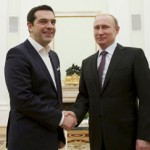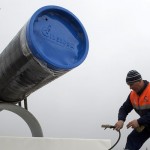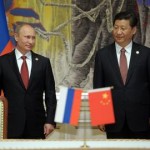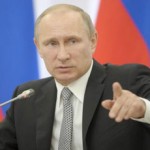Russia Takes Aim at Turkish Economy Amid Fighter-Jet Spat
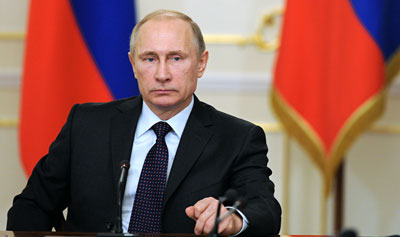
Turkish officials reject Vladimir Putin’s call for an apology
Russia announced plans to impose sanctions on an array of Turkish economic interests in response to Turkey’s shootdown of a Russian warplane, as Ankara called for calm.
Russian Prime Minister Dmitri Medvedev on Thursday told government ministers to prepare measures within two days restricting economic ties, including trade, tourism and joint investment projects, in response to what he called “an act of aggression.”
In Turkey, President Recep Tayyip Erdogan urged Moscow to drop its “emotional” stance over the incident and dismissed Russian demands for an apology.
“We do not find it correct to expand an incident—where the whole world finds us to be right—into political and economic areas,” Mr. Erdogan said.
Russia has responded furiously to the downing of its jet during a bombing campaign in Syria, an incident President Vladimir Putin on Thursday described as “treacherous backstabbing by those we considered partners.”
But Russia has played down the possibility of a military response to the incident, opting instead for measures that could punish Turkey’s economy.
While Russia didn’t announced a full list of proposed measures on trade and tourism, Mr. Medvedev said restrictions against Turkey could be expanded to include financial and commercial transactions and bans on Turkish business in Russia.
Russia’s economy minister said plans to expand a natural-gas pipeline under the Black Sea would likely be put on hold, along with a nuclear power station Russia is building and helping to finance in Turkey. Mr. Erdogan has previously said Turkey can find other partners to build its first nuclear plant.
Moscow began implementing some measures against Ankara Thursday, even as Mr. Erdogan warned the Russian government against undermining ties by responding to the military incident with economic measures.
Russian Agriculture Minister Alexander Tkachyov ordered tighter control on agricultural products from Turkey, including additional checks at the border and at production sites, saying 15% of Turkish products don’t meet Russian standards. Harmful and prohibited substances had been found in some animal products, and excessive amounts of pesticides and nitrates had been discovered in fruit and vegetables, he said.
Russia has introduced restrictions on imported foodstuffs amid tensions with other countries before. Past measures including a ban on wine from Georgia from 2006 and restrictions on various Ukrainian products. Russia banned European food products last year in response to Western sanctions.
Turkish trucks seeking to enter Russia were subjected to long delays at the border on Thursday, according to trade organizations.
Russian and Turkish leaders on Thursday continued verbal sparring over the incident, underscoring the deep divisions over Syria between Ankara and Moscow.
Mr. Putin reiterated Russia’s position that the aircraft was in Syrian airspace when it was downed, saying Turkey’s leadership was “intentionally pushing Russian-Turkish relations into a dead end” amid the crisis.
“We have yet heard neither apologies from the high military and political level in Turkey, nor about compensating the damage, nor a promise to punish criminals for the offense committed,” he said.
Turkish officials on Thursday continued to defend the shootdown, saying they had repeatedly warned Russian leaders about the risks their planes faced if they violated Turkish airspace, and that the Russian plane was warned several times before it was downed.
“If the same violation happened again today, Turkey would respond once again in the same manner,” Mr. Erdogan said.
The Turkish leader said Turkish forces didn’t specifically target Russia in the strike. Turkey, he told CNN in an interview later, wouldn’t be apologizing.
Relations between Russia and Turkey, particularly in trade, have expanded rapidly in recent years. Trade between the countries stood at $18 billion in the first nine months of this year, according to Russia’s Federal Customs Service, mostly accounted for by gas supplies to Turkey, the second-largest purchaser of the fuel from Russia.
On a visit to Ankara last December, Mr. Putin announced plans to expand a natural-gas pipeline and touted closer trade ties with Turkey, amid increased Russian isolation from the West over its interventions in Ukraine. Mr. Erdogan said at the time that he wanted to triple trade volumes to $100 billion by 2020.
Since then, Turkish businesses made significant inroads into Russia, ramping up previously banned dairy exports and securing bargains in purchases ranging from wood to energy, according to the Moscow-based Russian Turkish Business Association.
“The Russians had provided Turkey with many advantages, we were finding ways to make investments we previously could not execute; many big companies were entering the market,” said Oguz Kalaycioglu, trade adviser at the Russian Turkish Business Association. “At this moment, practically all of our burgeoning trade is at risk.”
Now, Turkey could lose around $12 billion, or around 1.6% of its annual gross domestic product, from Russian economic measures, according to Nomura International.
Russians account for around one-tenth of tourists to Turkey, bringing in $2.7 billion, and informal cross-border trade, such as traders who bring cheap clothes from Turkey to sell at Russian markets, add another $4 billion, according to Nomura. Turkey is among the top suppliers of fruit and vegetables to Russia, and its construction firms have a strong presence.
Russia’s consumer watchdog said Thursday it had withdrawn more than 800 kilograms of Turkish foodstuff from stores across Russia, the news agency Interfax reported.
Travel agencies have stopped selling trips to Turkey after the government recommended against traveling there. The Foreign Ministry, citing “terrorist threats,” said Russians shouldn’t visit Turkey and those there should return.
In a city in southern Russia, around 30 Turkish businessmen at an agricultural convention were detained for alleged travel violations and sent before a court, which fined them and ordered them out of the country, according to a spokesman at the Turkish Embassy in Moscow. Dozens more had problems entering the country, and around 30 were sent back to Turkey, the spokesman said. Russia’s Federal Migration Service declined immediate comment.
Such economic measures could also hurt Russia, analysts said. Inflation, already running around 15%, could be pushed up by a ban on imports of Turkish fruit and vegetables, although Russian officials played down such threats.
“It strikes me that through these kind of measures Russia is just increasing its own sense of international isolation,” said Tim Ash, an economist at Nomura International.
Source: WSJ – Russia Takes Aim at Turkish Economy Amid Fighter-Jet Spat









